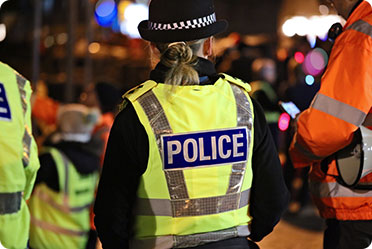
Recently, I had the pleasure of representing a seasonal police officer who worked for one of the New Jersey shore towns. He was a very nice guy with a concerned family in his corner and a spotless record. For the purposes of this article, he will be referred to as “Tom.”
When Tom initially contacted me, he was extremely upset and fearful of losing his license and career as a police officer, because he had been accused of a DWI. On its face, the case seemed like a bad one. Tom had driven his truck over a curb and into a house with the owner inside. Fortunately, the owner of the home was not injured, but part of the house was destroyed. The police conducted an investigation for a suspected DUI. Tom failed three field sobriety tests. The police took Tom back to the station and did breath testing. The result was .26% blood alcohol concentration (BAC) – three times the legal limit.
Tom assured me that he drank only a few beers over a period of a couple of hours and that there was no way he was intoxicated or had a .26% BAC. Yet, under the circumstances, Tom felt that he had no chance of being exonerated. He was hoping to simply get his license suspension, which stood at 7-12 months if convicted of the DWI, down to 90-days.
I assured Tom, although the case seemed like a tough one to win, even the worst cases have ended in victory. I would start my own investigation into the matter and begin thoroughly exploring the way the police did their investigation and breath testing.
After months of research, I was able to determine that there were major discrepancies in the case. The reports of the two officers who did the investigation were deficient in crucial ways. The first officer on the scene noted nothing about suspecting Tom of drunk driving. The second officer on the scene started the DWI investigation simply because a serious accident occurred and because Tom was leaning on the side of his truck. That was the sum of their initial suspicion of drunk driving.
Neither officer bothered to examine the interior of the truck that Tom was driving to see if he hit his head during the impact. Nonetheless, it turned out that there was evidence Tom hit his head on the windshield during the accident. The window had an impact mark on the driver’s side that resembled a spider’s web. This is a classic sign of a head impact. The result of such an impact would have certainly left Tom disoriented and unbalanced immediately after the accident.
The police neglected to take this circumstance into consideration when asking Tom to perform field sobriety tests. These tests involved balance. Certainly, the accident itself and potential injury to Tom could have affected his ability to do balance tests.
Moreover, Tom did not exhibit typical signs of intoxication. His speech was fine. He did not have fumbling hand movements. He did not stagger while walking. The major observations that police noted were that he talked slowly and moved slowly. Of course, these behaviors would also be typical following a major accident with potential head injury.
At this point, the results of the field sobriety tests were in certain doubt. However, I still had to find out why the accident occurred. Well, it turned out that that it there was dense fog and mist on the night of the accident. Both the weather reports and pictures from the accident investigation revealed as much. This accident happened at a “Y” intersection. Due to the weather, Tom could not see the stop sign or the turn in the road. That explained why he kept driving straight through the intersection and over the curb.
The second officer claimed in his reports that the weather was clear and dry. Yet, his partner wrote that the weather was foggy and misty. This discrepancy would certainly prove useful at trial.
Finally, a thorough examination of the breath testing device records revealed that the device had not been working properly. Additionally, I was able to retain an expert who would testify about the faulty device at trial. At trial, the prosecutor conceded that he would not be able to enter the results of the breath testing into evidence. Without the breath results, the State’s case was considerably weaker. The testimony of the police officers could simply not stand with all of the contradictory information that was uncovered.
As the trial proceeded, all of the discrepancies in the case were revealed. Ultimately, the judge found that the evidence was insufficient. Tom was not guilty of DWI. Needless to say, Tom and his family were relieved and ecstatic about the result. Now, Tom would be able to pursue his career and help the community.
Leckerman Law focuses on safeguarding the
rights of individuals charged with DUI, DWI, DAI, and
other alcohol-related criminal offenses - Call Us Now For
NJ DWI (856) 429-2323 | For PA DUI (215) 496-9292